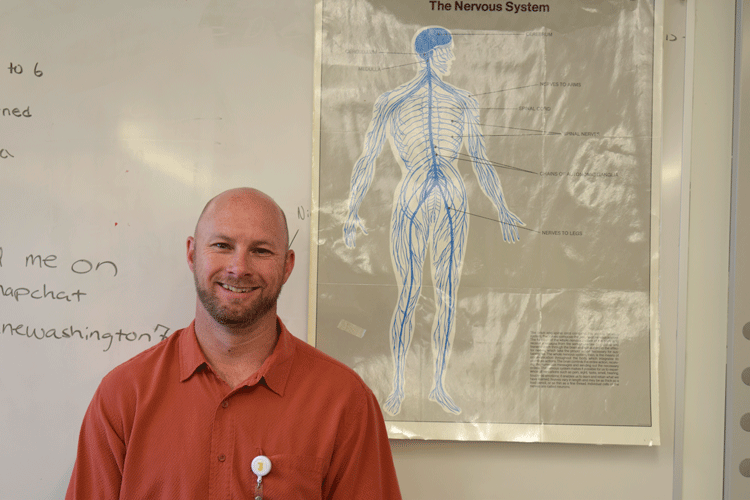
Scott Thomas displays what the internal human body looks like, which students had the opportunity to observe in the cadaver lab. photo by Michael Katsman
A few AP Biology students were able to experience a once in a lifetime event at a cadaver lab.
This year’s AP Biology students had the opportunity to attend the annual cadaver lab, which, for most people ia once in a lifetime experience. The lab was hosted at Wheat Ridge Hospital on May 3rd, at 6pm. Each student who attended the event was allowed to view, touch, and learn about human remains.
Twelve Spartans and their teacher, biology instructor Scott Thomas, entered a room stenched with formaldehyde, the chemical used to preserve the body. The head, arms, and legs were covered in order to protect the identity of the cadaver; the only information that the students were able to know was the gender and approximate age of the body. The class was accompanied by two medical students who provided the lesson about the cadaver. Each person snapped on rubber gloves, wore goggles for protection, and could use mint scented vapor rub to apply under their nose to mask the scent of the formaldehyde.
A person who is interested in submitting their body to specific research must fill out appropriate paperwork for their state in which they reside to “donate their body and not their organs,” said Thomas, who scheduled and attended the lab with his students. Thomas, who had attended the lab seven times before, reserves the cadaver lab every year for students to experience a unique, fun, and academic event. “I’ve attended the lab every year I’ve taught AP Biology,” explained Thomas.
Each student had the opportunity to touch every part of the body that was discussed. “The craziest body part that had been passed around was an arm,” said junior Giselle Robles. “The med-student just popped out the arm and handed it out.” Every body part that was left in the cadaver was pulled out, given information about, then passed around to the class to examine. “The best part of the cadaver lab was when we got to hold the brain, said sophomore Molly Berenbaum. “It was really cool knowing that you’re holding a person’s personality and memories.” Bizarre things were experienced by the students, such as holding a glass jar filled with a large chunk of hair from a woman with a disorder called trichotillomania or feeling a prosthetic hip implant. Throughout the lab, and after each body part was passed around, questions could be asked before moving on to the next step, with each answer discussed with a deep understanding.
The Cadaver Lab is a unique experience a student can have. The opportunity is so exclusive, only medical students who perform laboratory experiments and AP Biology and Human Anatomy high school students have access to the lab. The lab is a rewarding experience for the students who attend the AP class and allows many of them to enjoy a rare experience.